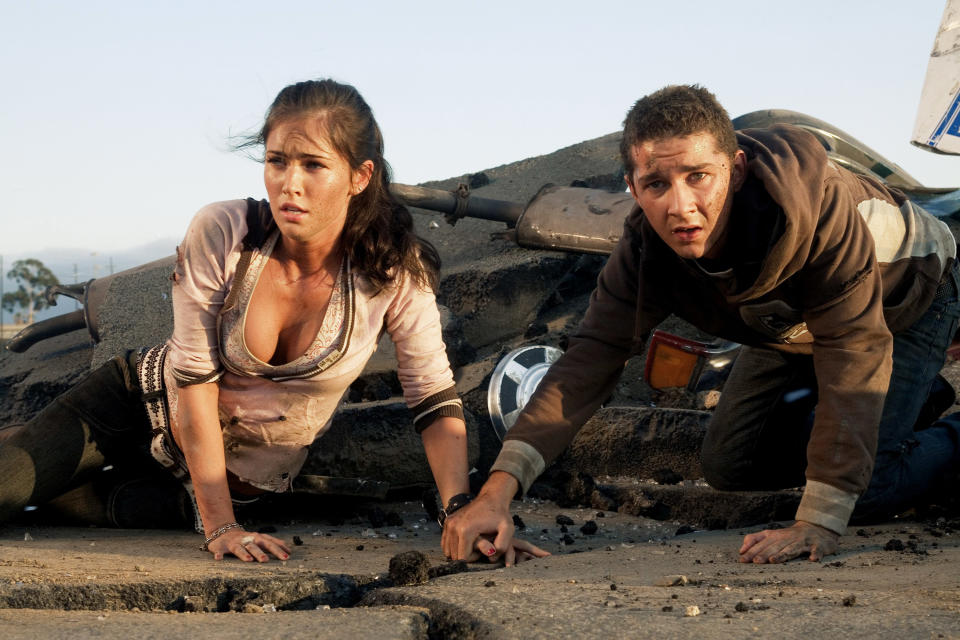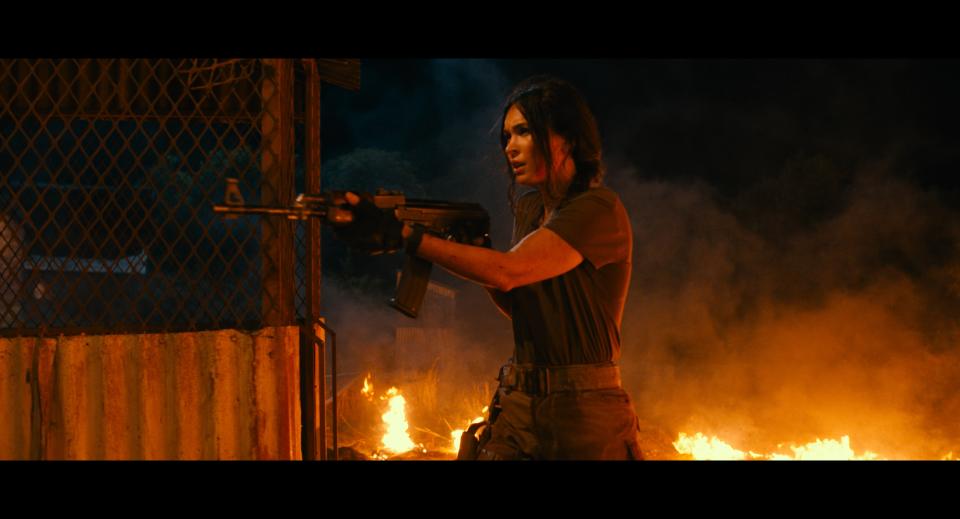Megan Fox defends 'Transformers' director Michael Bay: 'I don't agree with cancel culture'
Megan Fox’s first scene in Michael Bay’s 2007 blockbuster Transformers instantly transformed her into an international star and sex symbol. In the years since the film’s release, though, that sequence — which features Fox’s car jockey, Mikaela, bent over the hood of the Autobot, Bumblebee, in his Chevy Camaro form — has become a go-to example of Hollywood’s (and Michael Bay’s in particular) hyper-sexualization of young actresses. Fox’s depiction in Transformers became an issue again earlier this year when Twitter resurfaced a 2009 Jimmy Kimmel Live! interview where the actress talked about being cast as a bikini-wearing extra in Bay’s 2003 hit, Bad Boys II, when she was just 15. That, in turn, led to the resurfacing of the story behind her Transformers audition, which reportedly involved her washing Bay’s Ferrari at his house.

Ultimately, Fox took to Instagram to take control of her narrative: “While I greatly appreciate the outpouring of support, I do feel I need to clarify some of the details as they have been lost in the retelling of the events and cast a sinister shadow that doesn’t really, in my opinion, belong,” the actress wrote. She went on to note that her Transformers audition happened at parking lot of Bay’s production company, Platinum Dunes, with other crew members and employees present, and she was never required to wear anything suggestive. “There are many names that deserve to be going viral in cancel culture right now, but they are safely stored in the fragmented recesses of my heart,” Fox wrote in her Instagram post. “But when it comes to my direct experiences with Michael, and [Transformers executive producer] Steven [Spielberg] for that matter, I was never assaulted or preyed upon in what I felt was a sexual manner.”
Speaking with Yahoo Entertainment about her new film Rogue, Fox reiterates her gratitude for social media’s support of her attempts to deal with industry sexism over the years. “I was really grateful that people were coming to my defense, and were understanding of what I had gone through,” she says now. “For many years, I didn’t feel supported by anyone, so I do appreciate the support now.”
At the same time, she confesses that she hoped to avoid having to comment on the Kimmel situation at all, but felt the need to defend Bay — with whom she’s had a checkered history — from public condemnation. “It’s not something I’ve been longing to speak out on. But I don’t agree with cancel culture, and I don’t want people to get ‘canceled’ for something they didn’t do. While some of my working relationships were very challenging, that one specifically wasn’t one where I was sexually harassed or suffered, so I felt like I needed to defend him and clarify that. I have plenty of stories, but they don’t involve Michael. I really appreciated the support coming from people, but I also didn’t want to live with something that wasn’t the full truth.”
Asked how she feels about the way Bay filmed her in Transformers, Fox makes it clear she has no regrets. “I don’t think there’s anything particular lascivious about how I was shot in Transformers. I don’t remember anything even that provocative; it was all pretty high-school innocent. I didn’t feel objectified when I was filming it, and I think that’s the point, right? It’s how you feel when you’re shooting it, not how you feel when you’re watching it and I never felt compromised in any of those ways. So for me, it’s not something that I regret, and I don’t think it’s something that needs to be changed. When I watch it now, I don’t have any sort of negative reaction at all.”

That said, she’d be happy to see the future of the Transformers franchise follow the example set by Travis Knight’s widely-liked 2018 prequel, Bumblebee, and throw female heroes into the action instead of relegating them to the sidelines. “My generation didn’t have that; our childhood was stuff like Rainbow Brite, so we didn’t really have an action-oriented series to watch where the lead character was female. There’s definitely an audience for that now, and I can see [Transformers] going that direction for sure.”
Not for nothing, but Rogue represents a big change of direction for Fox, who is currently dating rapper Machine Gun Kelly after a high-profile split from husband, Brian Austin Green. Co-written and directed by M.J. Bassett, the intense action film — which premieres on demand on August 28 — casts the actress as tougher than leather mercenary Samantha O’Hara, who leads a crack team of soldiers on a hostage rescue mission in the South African wilderness. But the operation quickly goes haywire, leaving Samantha and her dwindling crew fighting for their survival against a well-armed group of rebels, as well as a pride of hungry lions. “It’s like nothing I’ve ever played before,” Fox says. “I’m not used to carrying those kinds of weapons and moving my body in that way. I had to lean into a masculine body language and worked on lowering the octave of my voice. I have kind of a baby voice sometimes, so I had to make it a voice where you’d go: ‘OK, she could command this group of grown men to do things, and they’d listen to her.’”

Fox reveals that — with Bassett’s encouragement — she even considered going so far as to shave her head for the film. “I’ve always been seen as this hyper-feminine character in the shows and movies I’ve done. So how do we counteract that [for Rogue] with all this hair on my head? There was part of me that was like, ‘F*** it: I’m ready to fully surrender myself to something like this.” Ultimately, though, the practicalities of that extreme makeover pulled her back from following in the footsteps of Sigourney Weaver in Alien 3 or Demi Moore in G.I. Jane. “I was debating: ‘If I shave my head, what do I do for the three movies I have following this? It might take a year to get my hair back — would I have to wear wigs forever and ever?’ So it came down to that, but even now I kind of partially regret not doing it. At some point in my future, I might come around, because that level of commitment is going to propel you into a performance that you’re going to be really proud of.”
For her part, Bassett says that she suggested Fox shave her head as way to subvert what audiences expected from Fox. “She’s been perceived and treated in a certain way by filmmakers for 10 years now where she’s an ineffectual vixen or a sex object for the male gaze,” the director tells Yahoo Entertainment in a separate interview. “And that’s not the person she really is. She’s a quiet, thoughtful woman who wanted to do this movie to move the needle on how people saw her. I really, really thought for a fleeting moment I was going to get her to have this incredibly bad-ass haircut. So I got really close to being the person that completely changed Megan Fox’s look! I bet she does it soon enough, because I think we put the idea in her head that she’d look extraordinary. Having said that, when you watch the movie I think you see a different version of her anyway, and I’m really proud of having achieved that.”
Beyond the buzz cut question, Fox and Bassett had specific ideas for how the actress would be filmed in this movie compared to her previous roles. “M.J. wasn’t f****** around,” Fox says. “She’s very familiar with the military and how they look and act, and she was really on top of me about that. It was intimidating, because I grew up doing ballet and all my movements and everything come from a very feminine place. It was a process, and she really helped me.”
Bassett — who came out as transgender in 2017, and whose previous credits include movies like Deathwatch and such TV shows as Strike Back — says she made a point of shooting Fox like one of the guys. “I think female action heroes should be framed like any other gender of action hero. Depending on the agenda you have as a filmmaker, maybe you’re looking to sexualize someone in the way you present the female physique to an audience. For myself as a trans filmmaker, I don’t want to do that. I think front and center is the strength of a character, whether it’s a man or a woman.”

“With Megan, I tried not to make her look as naturally attractive as she really is,” the director continues. “I put her in tactical gear, covered in blood and messed her hair up. The idea was that this character is, in fact, not a super-appealing person. Her femininity and maternal instincts have been completely buried by the job she’s taken and existing in a very male world. I relate to that as a trans woman who lived most of my life as a man in a male world: You bury s*** about yourself to fit in. That’s kind of what she’s done and the story of this movie is how she realizes you can be badass, maternal and caring all at the same time.”
Asked for her take on Transformers and the outsized role it plays in Fox’s enduring screen image, Bassett says that Bay’s vision of feminine beauty doesn’t necessarily jibe with her own. “I can see why it’s appealing; she’s a very beautiful woman, and people like Michael Bay want to photograph her in that way. For me, Megan in Rogue is in full battle rattle, and she still looks incredible. I don’t like to see young women sexualized and objectified as she was in those movies particularly, and I think we’ve moved on from that. They’re a product of their time, and I don’t think that is necessarily how a young woman would ever be presented in a mainstream movie again. At least I hope not. Michael Bay is an extraordinary accomplished filmmaker, and he has a vision of the world in a certain way, but it’s not for me.”
But Bassett is also quick to say that Fox’s own feelings about her portrayal are more important than hers. “It’s ultimately up to Megan about whether she felt comfortable and not used. There’s a reason why she’s an icon for a whole generation of young men: She was that girl and the way she was photographed was absolutely brilliant. If she was comfortable and didn’t feel exploited, then that’s totally credible.”

Bassett isn’t the first female filmmaker to make Fox’s hyper-sexualization part of the underlying metaphor of her movie. In 2009, the actress played the title character in the horror comedy Jennifer’s Body, directed by Karyn Kusama, written by Diablo Cody and co-starring Amanda Seyfried. A box-office bomb during its initial theatrical run, the movie has since found a vibrant and passionate fanbase for its subversion of genre tropes and traditional portrayals of women in horror. “It was too subtle,” Fox says of the rediscovery of Jennifer’s Body. “It wasn’t so obviously satire that someone could go, ‘I’m supposed to find this amusing,’ but it also wasn’t dark and scary.”
Fox also notes that the marketing materials heavily leaned into her Transformers image, even as Kusama set out to explode that in hilariously gross ways. “People thought they were coming to watch a movie about me being some really sexy succubus and actually I’m disgusting in that movie,” she says, laughing. “I’m vomiting over everybody, I’m screeching and crawling around like some demented grasshopper on the floor. It’s not a sexy role! Go watch Transformers for that: That’s a sexier movie, and I’m all tanned and oily. Jennifer’s Body was not that, but it was marketed that way. I’m so glad it has grown in popularity over the years. I’m proud of Diablo, Karyn, Amanda and myself: We made something for the culture that’s going to live for a long time.”
Rogue premieres Friday, Aug. 28 on VOD services including FandangoNOW and Amazon Prime; Jennifer’s Body is currently streaming on Hulu with a Starz subscription.
Read more from Yahoo Entertainment:

